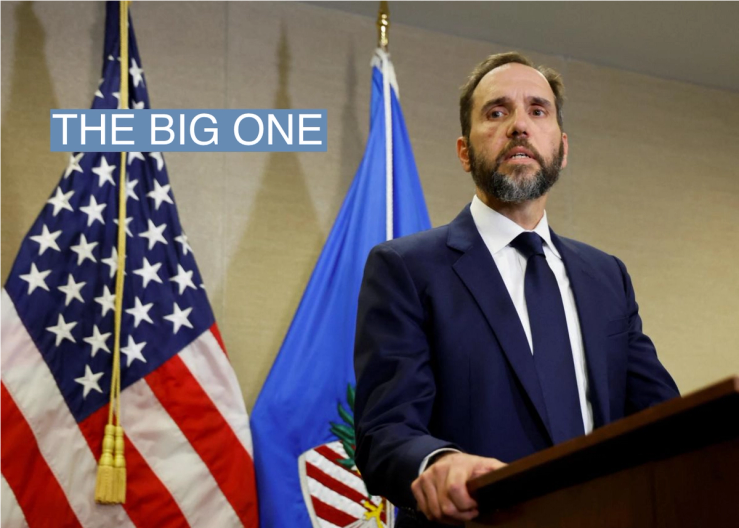The News
Jack Smith’s charges against Donald Trump over his attempt to overturn the 2020 election are high stakes and unprecedented. Here are a few of the biggest questions the former president’s freedom could hinge on.
The Questions
Was Trump just exercising his free speech rights?
The president’s lawyers argue he had a First Amendment right to speak his mind on the election and claim that it was stolen — whether or not that claim was correct. “Political speech now has been criminalized,” Trump attorney John Lauro told Fox News host Bret Baier Tuesday evening.
The indictment concedes that the president “had a right, like every American, to speak publicly about the election and even to claim, falsely, that there had been outcome-determinative fraud” that cost him a victory.
But some speech isn’t protected. Smith will try to prove that Trump’s words encouraged people to participate in an illegal fake elector scheme, or aimed to make the vice president illegally block the certification of the election.
“Freedom of speech cannot trump a conspiracy to overthrow the lawful election of a new President,” Carl Tobias, a law professor at the University of Richmond, told Semafor.
Did Trump know he lost?
This question goes to Trump’s intent. The indictment repeatedly says that Trump “knowingly” lied about the election. Trump’s lawyers argue that Trump honestly believed his claims and had no intention of deceiving anyone.
“I would like them to try to prove beyond a reasonable doubt that Donald Trump believed that these allegations were false,” Lauro said on Fox.
There are two potential routes around this defense.
The prosecution could try to point to examples where Trump seemed determined to overturn the election by any means necessary and uninterested in the specific justification — like when he told top Justice officials to “Just say that the election was corrupt and leave the rest to me and the Republican congressmen.” Former Trump aides told the House select committee investigating Jan. 6 that Trump privately acknowledged he lost the 2020 election.
Prosecutors could also show “willful blindness” — that Trump, by any reasonable standard, should have understood that his claims were false and his actions were illegal, given the number of lawyers and Republican officials who told him so.
Was Trump simply relying on his lawyers’ advice?
Trump said he “was advised by many lawyers” during the period in question. Even if figures like Rudy Giuliani and Sidney Powell lied, broke the law, or gave crazy advice, the argument might go, Trump was just a client.
The prosecution claims the lawyers were “co-conspirators” in the case, working with Trump to subvert the law and provide some patina of justification as needed. The usual bounds of an attorney-client relationship break down when it’s being used to advance a crime.
“If you’re planning with people an unlawful act, lawyer or non-lawyer, you can expect to be swept in,” Anthony Michael Kreis, a law professor at Georgia State University, told Semafor.
Will jurors buy that the 2020 election was actually stolen?
During his Fox interview, Lauro also vowed to “relitigate every single issue in the 2020 election” for the jury, presumably including the fraud claims which every courtroom has rejected: “It gives President Trump an opportunity that he has never had before, which is to have subpoena power since Jan. 6 in a way that can be exercised in federal court.”


